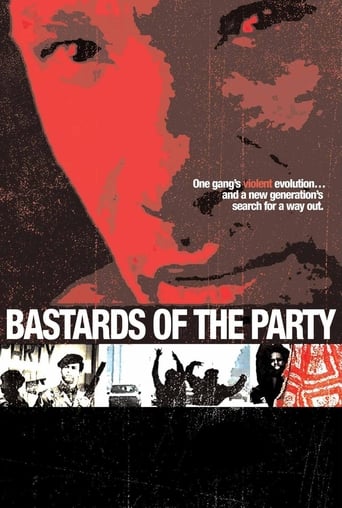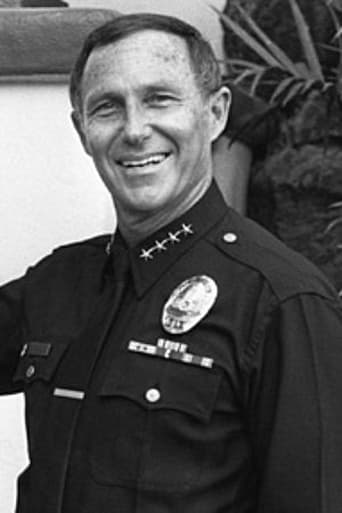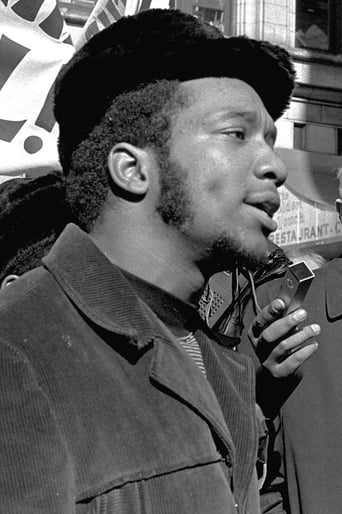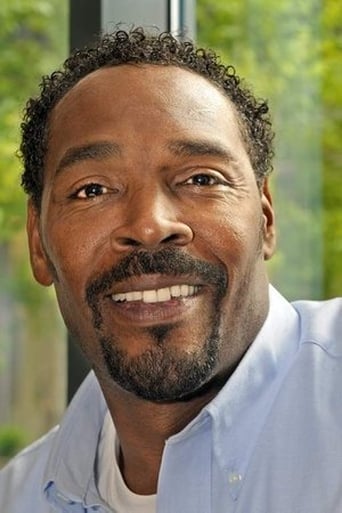

Bastards of the Party (2005)
Surrounded by death and the brutal lifestyle that feeds it, a Los Angeles gangbanger explores the history of Southern California street gangs from the 1950s through the 1990s in an attempt to fully understand his existence. Bastards of the Party humanizes the staggering casualties of the LA gang wars.
Watch Trailer
Cast


Reviews
Boring
it is finally so absorbing because it plays like a lyrical road odyssey that’s also a detective story.
Exactly the movie you think it is, but not the movie you want it to be.
This is a gorgeous movie made by a gorgeous spirit.
The Good: This was an informative, compellingly structured documentary on the genesis and evolution of LA gangs. The story is told via an oral history by first generation gang members and then proceeds to unfold with more contemporary members (and ex-members). The film contains a high degree of advocacy (especially in the final 30 minutes) that seems reasonable.The Not so Good: The director clearly lays the blame for gangs and gang violence on Caucasians. Although there is no disputing that institutionalized racism of slavery on up to the end of segregation definitely created gross economic and social injustices, the director fails to make a compelling case that whites directly caused inner city blacks to wage war on each other for decades. The director touches on some of the more salient factors, such as factory jobs (i.e. unskilled labor) opportunities disappearing, but fails to identify that as a root cause. Instead, we are presented with numerous examples of institutional and individual racism--including conspiracy theories involving Iran-Contra, J. Edgar Hoover, LAPD, et.al. Nowhere within this otherwise excellent documentary does the director touch on individual responsibility, personal morals, etc. Gang members (including murderers) are presented as victims of society. The director focuses much attention on the Black Panther and US movement of the 60s and 70s however this narrative is presented mostly to advance a conspiracy theory of how the FBI sought to destroy the groups, ultimately resulting in a lack of political power and community disarray. He goes on to try and blame the influx of drugs into the community as an orchestrated effort by Washington to fund the Contras.This film is good and worth a viewing. It provides an interesting insight into the evolution of LA gangs as well as how some African Americans perceive history. Unfortunately the director focuses too much time on trying to shift blame away from the violent trigger-pullers who admittedly were, and are, his friends. He is trying to shape history in a way that absolves his community of responsibility for the violence in order to empower them to find a way out of that lifestyle. This film presents that case well (although not compelling to me); hopefully it will help the next generation steer clear of joining gangs.
I really wanted to like this movie and I like Cle Bone Stone a lot. But the movie tended to present something as fact, then drop it, and move on to something else. I'm not naive to gangs: I work with gangs: the bloods, the crips, and a local NYC gang "LB". I really liked Cle and I'm hoping that one day he'll be courageous enough to do an autobiography of himself. That would, no doubt, be an outstanding movie and an Oscar winner. Bastards of the Party is a fine movie.. It's just that I thought it could have been an exceptional movie.However, I applaud Cle Bone Stone for his work on this excellent documentary.
Bastards of the Party is a new documentary running on HBO that examines the rise of gangs in the Los Angeles area. It starts out a little slow and seems to be making excuses for the members - the same tired ones you have heard over and over - but it quickly turns into a fascinating historical piece.From the early days when Compton was an all-white area, through the civil rights movement and rise of the US Party and Black Panther Party - it is compelling stuff. The real eye-opening stuff involves the actual demise of the BPP and USP orchestrated by Hoover's FBI. The information about the FBI's CoIntelPro and their efforts to undermine these groups is now public record, what surprised me was the details about how the program started these groups fighting each other.The legacy of the FBI's destruction of the black cohesiveness still survives with the black-on-black crime that is still rampant between these gangs nearly 40 years later. The only downside of the film other than the apologetic start is the left-wing politico-speak that summarizes the film. It is a good history that does an excellent job of giving the facts, when it slips into this type of preaching, it loses a lot of credibility.The final point about gang names versus given names is especially poignant. Good stuff.
I saw a "screening print" of "Bastards of the Party" at the Tribeca Film Festival.It's helpful to understand the full arc of the documentary as a longitudinal exploration of the roots of gang and police violence in Los Angeles in order to get past the opening section to when the theme is finally declared.The first part is a salute to the Black Panther Party in California in the 1960's that is at first repetition of the usual history and then degenerates further into interviews with self-aggrandizing, middle-aged survivors posturing for posterity in an effort to preserve the images of themselves they want to project as a legacy that becomes my-eyes-glaze-over cliché-ridden rhetoric for the viewer.Then director/on screen narrator/participant-witness Cle Shaheed "Bone" Sloan comes on the screen to explain his thesis and the movie really starts getting interesting - that the gangs of L.A. are the titular descendants of the Panthers. He then proceeds to go through the changes in Los Angeles decade by decade, though not strictly chronologically, sociologically, culturally, economically and politically (as well as very personally) to demonstrate how the current volatile racial situation step by step resulted from the destruction of the Party. It serves as chilling non-fiction background to TV series "The Shield," for L.A., and "The Wire," for how applicable it is to many inner cities across the country.This very much comes across as a story about outlets for testosterone as basic as throughout human history, here channeled in the late twentieth century through the police, politicians, the media and the drug and violence dealing gangs they in some sense created.Rather than focusing on the usual truisms about single mother-headed families, though we do hear some ranting about dysfunctional family clichés, we see what happened to the men in the African-American community from childhood on under oppressive economic and political conditions, though no mention is made of whatever impact the welfare system had, laid out as if it is a passionate Ken Burns documentary on Reconstruction.We also don't hear much about nonviolent alternatives rejected or wasted, because the camera focuses on the most charismatic spokesmen -- even if what they are saying is preening bull for the camera. I think that at a certain point even the director realizes the gang members' strenuous comparisons of themselves to the Panthers sound like delusions of grandeur and self-justification. The older gangsters reflecting on the world they want to make now for their children is touching, as it contradicts stereotypes of African-American fathers in the inner city.But we don't even hear from a woman until near the end as a mother cries about the funeral of her son. And then the funerals mount up, as movingly as any film about genocide.The finale, however, weakens the impact of the film as the director appears on screen as a former gang banger (and in excerpts from TV interviews, such as with Larry King) just as self-aggrandizing as the opening subjects so we start questioning his credibility.The film is also weakened when the changes are explained in left-wing jargon, especially as mouthed by white professors (and it's a shame that virtually no non-white academic experts are interviewed for at least visual balance), though a Senate staffer is very convincing about conspiracies by just factually summarizing a report.The astounding archival photos and videos capture the zeitgeist, especially in striking material from individuals as we see hair and fashions authentically change.The film was executive produced by Antoine Fuque, for whom the director acted in "Training Day," but other credits were missing in the print and I assume some music as the lack of much hip hop on the soundtrack was inexplicable otherwise, particularly as rap gets zero mention in the film as any kind of influence.With the extreme language and images in the film, PBS is not an option as a future outlet.




